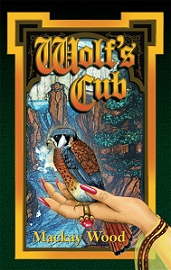| January 13th, 2011: My stories all start with a vision. There’s no other way to describe it. I see a character in a place or situation—and I know that character. It’s not that I have the whole plot (or anything like), but who my character is and what milieu he or she inhabits, along with a great deal of that character’s personal story—that, I do know. |
| Wolf’s
Cub, my first published novel, began when I saw a young girl on her
journey to an arranged marriage, in a place and culture like post-Roman
Britain. That vision led to the questions that gave me the
story: arranged marriage with whom? Why was it
necessary? Those questions led to a more indelible vision of the
hero. Just as well: it’s Herric’s story more truly than Elaine’s. Wolf’s Cub was the first thing I wrote that I considered worth the work to get right. It taught me a critical lesson: writers need to know what they are writing. Yeah, I thought it was a historical novel. Figuring out that I was really writing a fantasy not only freed my imagination, but fixed problems with the plot, which included an amorphous antagonist and no satisfying climax and denouement. |
 |
And then I learned that
every novel teaches a different lesson. After Wolf’s Cub, my editor
expressed interest in a sequel, so I had to learn how to write one. Of
course the characters and world already existed, but launching a new
story posed all sorts of questions. How much backstory should be
included for readers who hadn’t read the first book? How to make the
second story valid all on its own, while being true to the first book
and the changes the characters had undergone? New lessons.
Riddle of the God, my fifth worth-the-work novel, was tough. Silly me, I started it because the book I’d been planning (which still exists only in outline) intimidated me because the hero was so very different from any of my other main characters. When Riddle’s hero introduced himself to me, he hadn’t yet undergone the terrible trials he had to suffer, so he seemed far easier. Hah! Laudrie de Jouyere is the most complex and difficult character I ever conceived. Nothing he does is straightforward, and the world he inhabits is laced with intrigue…
The lesson? If you jump in the deep end, you’d best learn to swim in a hurry.
Still learning. But it’s all part of the challenge, and the fun, of writing. Writing is fun—and more useful than being sent to the funny farm for talking to voices in your head. I write for much the same reason I read, so I can find out what happens next. The best part is, there’s help out there: other writers and wonderful organizations like Pikes Peak Writers or Rocky Mountain Fiction Writers. If you’re a writer too, I urge you to contact a good writers group. It’ll be the best favor you do for yourself, apart from actually sitting down and writing.
Riddle of the God, my fifth worth-the-work novel, was tough. Silly me, I started it because the book I’d been planning (which still exists only in outline) intimidated me because the hero was so very different from any of my other main characters. When Riddle’s hero introduced himself to me, he hadn’t yet undergone the terrible trials he had to suffer, so he seemed far easier. Hah! Laudrie de Jouyere is the most complex and difficult character I ever conceived. Nothing he does is straightforward, and the world he inhabits is laced with intrigue…
The lesson? If you jump in the deep end, you’d best learn to swim in a hurry.
Still learning. But it’s all part of the challenge, and the fun, of writing. Writing is fun—and more useful than being sent to the funny farm for talking to voices in your head. I write for much the same reason I read, so I can find out what happens next. The best part is, there’s help out there: other writers and wonderful organizations like Pikes Peak Writers or Rocky Mountain Fiction Writers. If you’re a writer too, I urge you to contact a good writers group. It’ll be the best favor you do for yourself, apart from actually sitting down and writing.